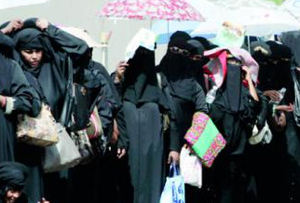 Riyadh, Aug 19: Many expat women are still reluctant to transfer their sponsorships from their male guardians onto their employers despite new Labor Ministry laws.
Riyadh, Aug 19: Many expat women are still reluctant to transfer their sponsorships from their male guardians onto their employers despite new Labor Ministry laws.
Abeer Aslam, a human resources consultant in Riyadh, said many expat women just don’t have the guts to leave their comfort zone of security under their family sponsorships.
“Most expat women have grown up here and cannot risk being sent out of the country if their visas get canceled,” she said.
“The implications of transferring sponsorships should be clearly stated. Such a step should be a source of security, not a source of anxiety.”
“In addition, there should be a comprehensive website containing information on how to transfer sponsorships and clear laws stating that women can revert to their original sponsors in the event they quit or are dismissed without having to leave the country.”
Private schools in the Kingdom are hiring Saudi teachers since many expatriates chose to not transfer their sponsorships.
Demand for female teaching jobs is the highest in the Kingdom in comparison to other career options.
A study by the Human Resources Development Fund (HRDF) found that 76 percent of Saudi women have since been on the hunt for teaching jobs.
Hiba Khurshid, a Pakistani teacher, was previously working at a school in Riyadh, but lost her job because she remained on the sponsorship of her male guardian.
“I believe that the nationalization scheme within the female work force has caused more ethnic division among minorities,” she said.
Fresh graduates from universities in the Kingdom are also struggling to find jobs since companies are just as reluctant to sponsor expats for fear of upsetting the Saudi-expat ratio.
Afifa Khan, an architecture graduate from Effat University, is one such example.
“Companies are no longer as happy sponsoring expats for fear of being penalized under the Nitaqat nationalization scheme,” she said.
“We are also not well-paid and this affects the way we are treated. The constant fear of being sent on final exit is what stops many from leaving the sponsorship of their male guardians.”






Comments
Add new comment